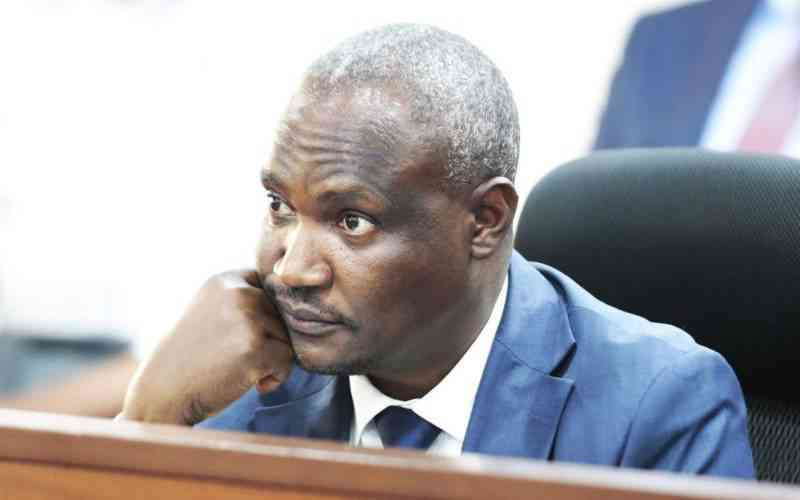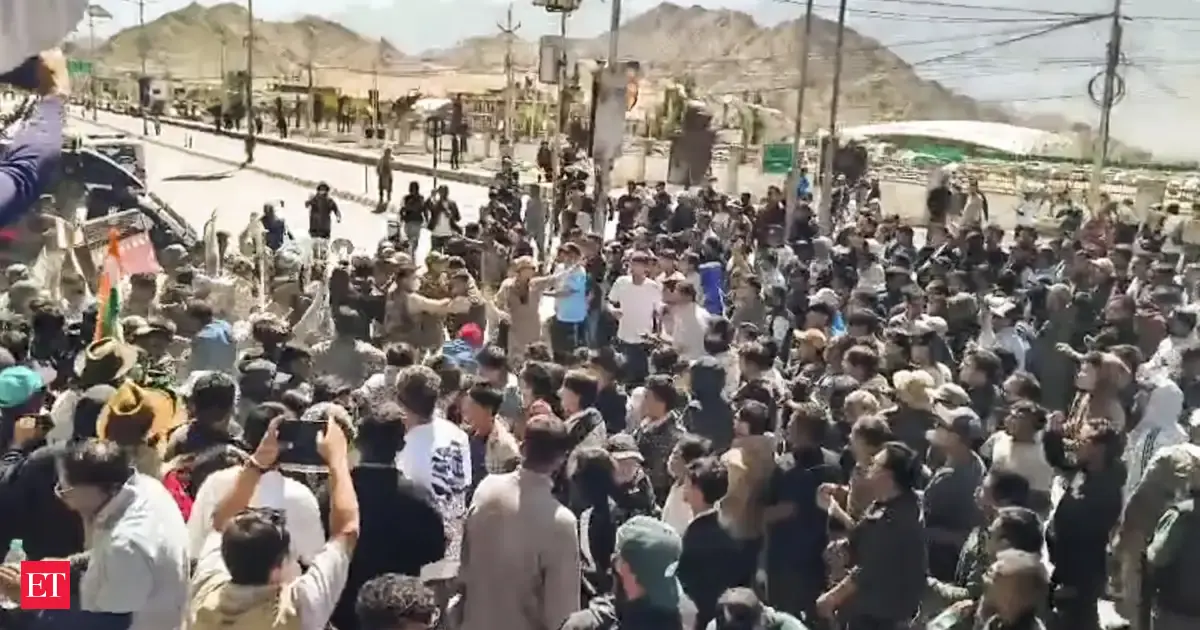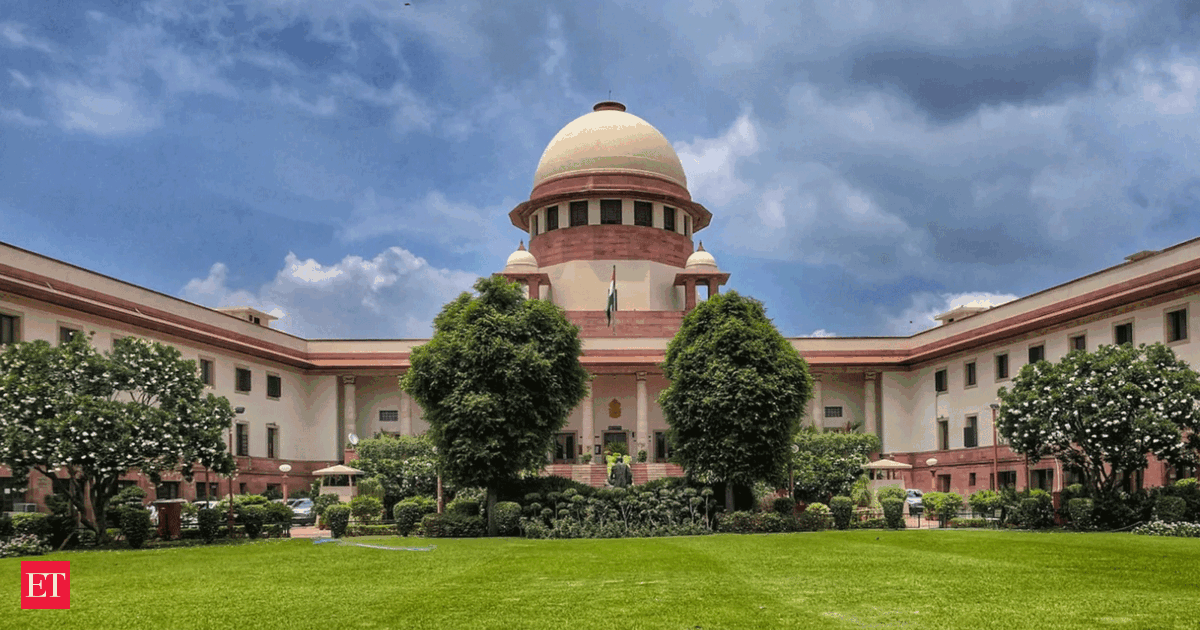By Macharia Kamau,Standard Business
Copyright standardmedia

Treasury CS John Mbadi at Parliament Buildings. [File, Standard]
Kenya is set to get a new set of tough conditions that it must meet to get a new round of funding from the International Monetary Fund (IMF).
In the previous programme that ended in March this year, the conditions meant higher taxes aimed at increasing tax collections and withdrawal of subsidies to cushion Kenyans against harsh economic times.
They also elicited doom for many in public service as the IMF urged the government to undertake reforms within parastatals that would see many lose their jobs.
The IMF last week announced that it had started negotiations with Kenya for a new funding facility at the invitation of Kenya.
The funding facility will come shortly after an agonising three-year period during which the government hiked taxes to meet the IMF’s conditions and access its concessional loans.
While the government failed to meet numerous IMF conditions that were deemed too tough, especially touching on reduced spending, staying away from unnecessary debt and taming corruption, it succeeded in putting in place measures that hurt Kenyans.
These included hiking taxes and withdrawing several measures meant to cushion Kenyans from the high cost of living, including subsidies.
IMF officials will be in Kenya between September 25 and October 9 for initial discussions with the government, which are expected to lead to a potential IMF-supported programme. The new programme will succeed the IMF’s Extended Fund Facility and Extended Credit Facility, in which the Brettonwood institution was to initially disburse $3.6 billion (Sh468 billion) for budget support over 38 months, starting April 2021.
IMF did not disburse the entire amount as the government failed to meet many conditions, and the programme was also extended beyond the 38 months.
The release of the funds, which was done periodically after IMF reviews, was on condition that Kenya met the terms set by the IMF.
In March this year, National Treasury Cabinet Secretary John Mbadi explained that the ministry and IMF had mutually agreed to pursue a new programme and abandon the final review due to time constraints, dismissing concerns that Kenya did not meet IMF conditions.
“We successfully went through eight reviews, we had one review left, but we had limited time during the period when this programme ends on April 1. We sat down with the IMF when the mission was here and agreed we cannot complete the review within the time left, and mutually agreed to start discussions on a new programme as opposed to pursuing the ninth review,” he said.
Mbadi has in the past said some of the conditions that Kenya agreed to were too tough to meet, and it is to be seen what sort of a bargain Kenya gets when the negotiations are done, with Mbadi heading the team negotiating with the IMF.
Over the three-year period, Kenya met some of the IMF conditions but would largely fail to meet others, with the IMF applying waivers to enable Kenya to access the funding.
Kenya succeeded in bringing down inflation to within the Central Bank’s range of between 2.5 per cent and 7.5 per cent.
This, however, had the impact of increasing the cost of credit for Kenyans.
The government was also able to stabilise the shilling against major world currencies as well as address deficiencies in anti-money laundering and combating financing terrorism after passing an Act, which is expected to see its removal from the FATF (the Financial Action Task Force) Grey List
The condition to withdraw subsidies, particularly on fuel, had a mixed outcome, with the government still subsidising petroleum products over different pricing cycles.
Some of the conditions that Kenya failed to meet include taming corruption, which was expected to be achieved through reforms across different government agencies.
There have also been delays in implementing reforms at state-owned entities (SOEs). In reforming the SOEs, the government was expected to put in place measures to improve operations and financial performance through cost rationalisation and reduce their dependence on the Exchequer.
Among the SOEs that were earmarked for major restructuring were Kenya Airways, including bringing on board a strategic investor and weaning the carrier off exchequer support.
It, however, managed to achieve some of the proposed reforms at Kenya Power, where it introduced a new board that is reflective of its shareholding, as opposed to the previous scenario where the board largely represented government interests.
There are, however, pending issues, including the transfer of some of the power retailer’s assets to the Kenya Electricity Transmission Company (Ketraco).
Electronic procurement and eventual rollout of the Electronic Government Procurement (EGP) system were also among the conditionalities by the IMF. Treasury has been faulted by procuring entities for the hurried rollout of the system.
The government was also expected to give a clear way forward on tackling the government’s pending bills to business, which remains pending. It was also supposed to put in place measures to increase tax revenues as well as reduce its appetite for loans to bridge its ever-expanding budget.
In his early days in office, CS Mbadi had noted that the government may have been overambitious in agreeing to some of the conditions, which were agreed to during the Jubilee Administration’s last year in power.
While the CS noted that Kenya cannot sever links with the IMF, he noted that the conditions that had been set were unrealistic.
“We must be realistic. I completely believe that some of the targets that we had set with the IMF were unrealistic,” he said, noting moving from a fiscal deficit of 5.2 per cent of GDP to 3.8 per cent was too ambitious.
“It should have been gradual.”
Mbadi also noted that it is a tall order for any economy to grow its tax-to-GDP ratio by two percentage points in one year.
Different government officials have in the past said Kenya could increase the tax-to-GDP ratio to 16 per cent from 14 per cent and push it to over 20 per cent in the medium term.
“You cannot increase tax collections by two per cent in any economy; you will cause disturbance. It is not practical,” said Mbadi.
The harsh conditions that IMF had given Kenya were implemented over time, including in the Finance Act 2023, during which in its bid to grow tax revenues as per IMF requirements, the government increased Value Added Tax (VAT) on fuel to 16 per cent from eight per cent, higher pay as you earn (Paye) tax for high income individuals, digital asset tax.
A higher turnover tax and the housing levy. Analysts note all the measures in the Act were in line with the IMF’s conditions for the Treasury to grow tax revenues.
The proposals in the Finance Bill 2024 were perhaps the harshest, with different measures expected to raise Sh344 billion in new tax revenues.
It resulted in widespread protests last June as Kenyans rejected the bill and eventually forced the government to withdraw it. The bill contained what analysts have termed as IMF “fingerprints.”
Kenya’s debt to the IMF stood at Sh472.16 billion as of July this year, according to data by Treasury.
Treasury’s heavy reliance on IMF and other lenders, analysts note, has been the easier way out instead of taming their spending to be in line with tax revenue collections. The financial institutions, on the other hand, are eager to dish out the loans for profit.
“At the heart of the problem is what is referred to as the ‘politician-banker’ complex. The politician always desires a larger budget for his political objectives, and the banker is willing to fund these initiatives if the interest paid is sufficiently high. And so it becomes a win-win solution for them. The loser, however, is the common citizen who, at the end of the day, will be responsible for footing the bill,” said Ken Gichinga, chief economist at Mentoria Economics, in a recent interview.
Prof Samuel Nyandemo, an economist and lecturer at the University of Nairobi, said the government has always anchored taxes with a lot of influence from the International Monetary Fund (IMF), which may ultimately lead to an increase in certain prices.
“Much of these policies are forced on us by the IMF and the World Bank. We should have homegrown solutions in terms of our budget, not relying heavily on international lenders to fund our deficit,” said Nyandemo.
In continuing to work with the government, including giving Kenya loans, institutions like the IMF are seen as enabling corruption within the government, as well as saddling Kenya with debts to the point that the sustainability is now in question.
The Okoa Uchumi campaign noted that the government has been mismanaging Kenya’s economy as the IMF urged it on.
“The IMF bears its share of the blame for the morass that Kenya finds itself in, having long enabled the governing elite’s ravenous appetite for debt. It must reflect on its role,” said the Campaign in a May 2025 report authored alongside its partners, the Institute of Social Accountability (Tisa) and Africog.
In the report, the civil society lobbies noted that they had delivered a memorandum to the Board of Directors of the IMF and other stakeholders at the Spring meetings of the Bretton Woods Institutions in April 2025, in which they urged the IMF to self-reflect and acknowledge that its policies have done more harm than good to the Kenyan economy.
“The IMF has played a key role in supporting the GOK as it ran the economy into the ground, and must also bear responsibility,” said Okoa Uchumi in the report titled Stealing the Future.
It adds that the IMF “policies have had the effect of damaging a promising developing economy by supporting a predatory government in sinking citizens into unpayable debt.”
“The latest Budget (2025/26 financial year) shows emboldened and continued economic mismanagement, which will only increase the fears of those who are the promise of the future: the young, educated people who have risen in anger, not just in Kenya, but across Africa.”
“This could end in the highest cost imaginable if their demands for transparency, people-centred growth and an end to endemic corruption continue to be ignored.”
The government has further been accused of borrowing unlawfully. Bernard Muchere, a certified fraud examiner who worked as an auditor at Treasury, argues that the loans taken out over the last three years do not tally with the development projects implemented. He pointed out that only Sh958 billion had gone into development out of the Sh4.2 trillion borrowed since the Kenya Kwanza regime came to power.
“Borrowings are lawfully required to finance only development expenditure. For the three financial years of the Kenya Kwanza rule, the actual development expenditure aggregated to approximately Sh958 billion. If we assume that the development expenditures were financed by borrowings only (no tax revenue was used), it means President Ruto borrowed unlawfully (odious debts) of approximately Sh3.3 trillion (being Sh4.2 trillion minus Sh958 billion),” he said.



